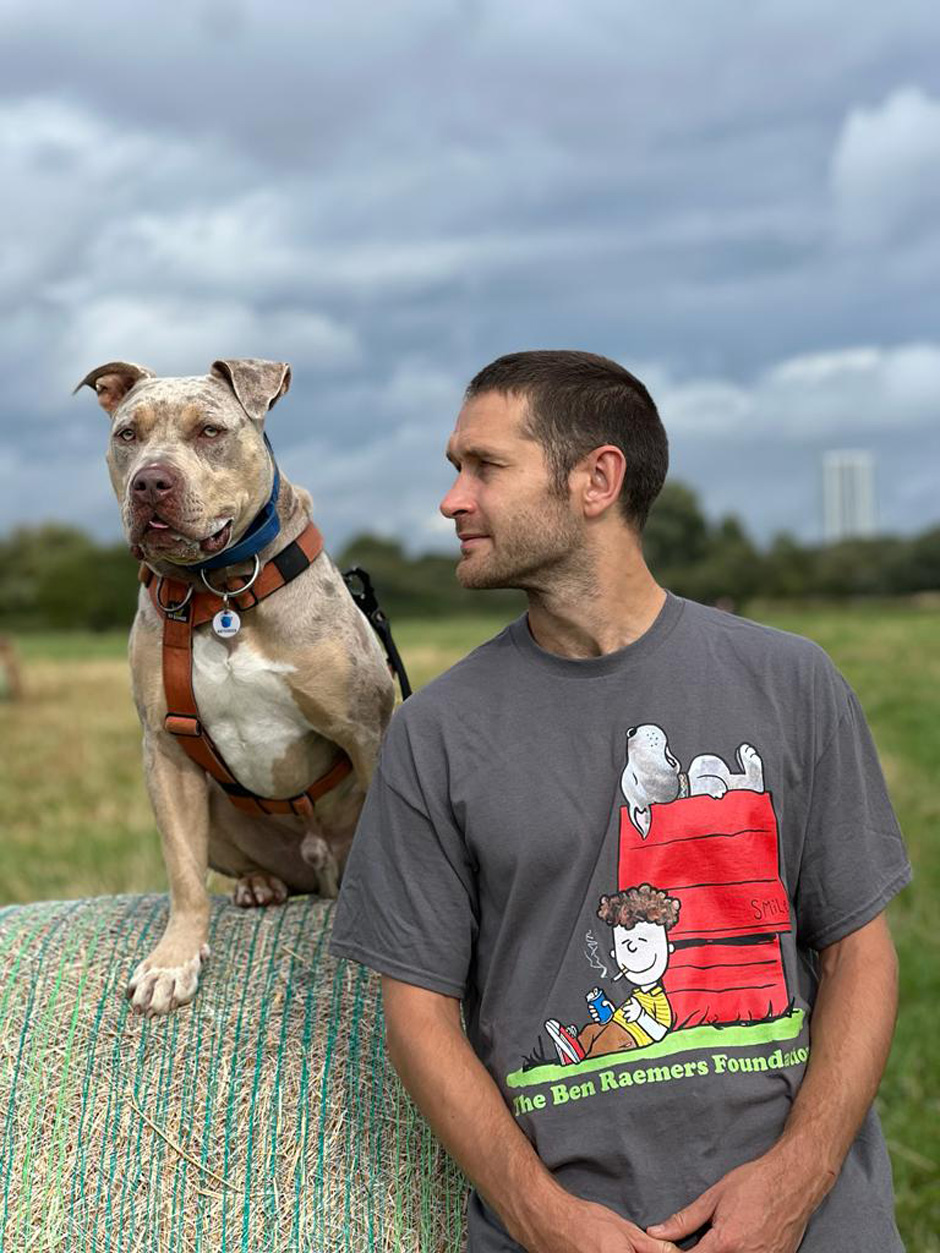Checking In with Casper Brooker is a new video from the Ben Raemers Foundation that examines the routine and structure he approaches everyday with and why it is important. Expect to see some of his trademark magic at Southbank and further afield accompanied by his thoughts. This excellent new format was created to impart helpful tips for positive productivity and also to promote the Suicide First Aid Lite training offered by the foundation. To accompany this video we also spoke to Rob Mathieson about his work making these films, their impact, and the important work the foundation is doing…
Hopefully Casper’s story resonates with you, it is full of helpful insights and encourages everyone to take part in the Suicide First Aid Lite training that is now being offered for free. We enjoyed seeing this video go live last night and it motivated us to catch up with our old friend, and Ben Raemers Foundation founder, Rob Mathieson, for a little check in of our own. Keep scrolling to read some of Rob’s thoughts about his filmmaking work for the foundation, the story so far, and the learning journey it continues to promote…

Ben Raemers Foundation founder Rob Mathieson and his dog Lenny
We began making videos for the Ben Raemers Foundation three years ago, the first video was with Nick Jensen who is one of my good mates, and the following one was with Aaron Herrington who I already knew also. We didn’t fly by the seat of our pants either, they were planned. So the initial videos weren’t as ominous to make as they could have been. It’s obviously more nerve-racking travelling somewhere on a plane to meet someone you don’t know so well versus cycling around the corner. James Coyle who has filmed all of the SMiLe videos is very talented and professional which is a great help to the process, he does an amazing job on the final edits. Once we had made a few the response was so positive, especially at the screenings and events with Q&A sessions. We had no idea it would be like that, when planning the first Q&A events we even prepared a few planted questions in case the audience was hesitant to participate. We needn’t have worried, the conversations have been great, if anything we have had to cut them short due to time constraints at the venue.
I was pleasantly surprised by how well people took to what we are doing, and that they wanted to watch the videos because they are obviously dealing with difficult subject matter. I’m so grateful to Nick [Jensen] and Aaron [Herrington] for being brave enough to share their stories at the outset because it has opened the door for many others to do the same. I spoke to Nick [Jensen] the other day and he told me he still gets messages today from people reaching out to thank him for that film, and sharing their stories with him about similar issues. The films are obviously having an effect on people which is what the aim of them was, they are a resource now that people can watch. They are something people can engage with and become part of the conversation. It’s powerful seeing people you look up to sharing things they are going through, especially when you may be struggling yourself. It lets them know it’s okay for them to talk about these things too, and feel less alone.
“I spoke to Nick [Jensen] the other day and he told me he still gets messages today from people reaching out to thank him for that film”
I think I was the least nervous about making the first film, Nick’s one, because I know him so well. They have all gone really well and everyone we have spoken to has been super cool. I wouldn’t say we have a formula because each film is different but I definitely have a better idea now of how the film will look, and how we want to tell the story when filming for it. Going back to Nick’s first interview, even though he is one of my best friends I didn’t know everything he told me. I knew parts of his story because I had spent so much time with him but we had never had a conversation like that, so it was really nice.
People really open up, the one we did with Brian Anderson was absolutely amazing, I think that’s one of my favourite ones. With someone like Brian who so many people look up to, it was incredible that he was able to be so open and honest. He was so accommodating too, he looked after us, and helped to organise our conversation with Fred Gall. It’s good to know that there really are amazing, nice people out there. Hopefully anyone watching those open conversations about difficult subject matters will be inclined to open up to their friends in their daily lives. The films are there to get rid of that stigma and make it less of a taboo to talk about these things. Everyone is going through something or will do one day. It’s much better to be able to share that.
The Checking In films, like the recent one with Casper Brooker, follow a day-in-the-life format. One thing that kept coming up when we spoke to people was that skateboarders, especially ones who have a career within skateboarding, often lack a structured routine. Another thing which is an issue, you see this with footballers and other professional athletes too, is what to do when that career finishes. Set routine is so important, it happened a lot with Ben Raemers, he would often be hitting me up to do something. In America he would be able skate all day or fill his time with something, then back in the UK often his friends would be at work or otherwise engaged, so filling those hours productively became an important consideration.
With these films we wanted to show the day-in-the-life habits of different skaters, their routine, how they plan out their days, and establish some kind of structure. These interviews also mean that people don’t need to be so vulnerable. Instead of opening up about a serious mental health or addiction issue they have had, they can just go skating with us for the day. Hopefully everyone can enjoy the skateboarding but also learn something about structure and routine, and receive positive tips from people about how they get through the day. These films will be a little bit of a lighter watch, and it’s encouraging to see the recent video gaining quick traction.
“Hopefully everyone can enjoy the skateboarding but also learn something about structure and routine, and receive positive tips from people about how they get through the day”
The other thing is that everyone who does a Checking In film will also be doing the Suicide First Aid Lite training. This is a free resource offered by the Ben Raemers Foundation. I’m learning things personally with every film we make, from every person we speak to. I feel more confident having those conversations now. They are always going to be heavy and you may feel awkward or nervous, but by having them you’re learning. That’s why this training we are offering is great, it gives you the skills, helps you to use the correct language, and teaches you how to listen properly. Listening is important, and learning that you don’t have to offer a solution but just be there for someone. I feel more confident now but these things are difficult, and will make anyone nervous. Learning about the right questions to ask, and the right language to use equips you with helpful tools to approach these conversations.
“everyone who does a Checking In film will also be doing the Suicide First Aid Lite training. This is a free resource offered by the Ben Raemers Foundation”
We are currently working on a new SMiLe film, and have another one already filmed. There are more plans for Checking In films in the pipeline, and we have another one of those already filmed too. We want to keep that momentum going. I’m so stoked on how much support and love the Ben Raemers Foundation has received, from an idea born from grief and a desire to build something positive in its wake. We had no idea what it was going to look like when we first started it, I’m just glad about the positive impact we have managed to make. We posted the Casper video last night and there are already lovely comments, and feedback. I would like to think that Ben’s silhouette has become an iconic image associated with something that’s paving the way for change. It would be great if everyone can continue to share what the foundation is doing, and keep these conversations happening. Talk to your friends.
To support the Ben Raemers Foundation you can currently pre-order two colours of the Doghouse T-Shirt Rob is wearing in his portrait. Be sure to follow the foundation on Instagram, and watch all of the videos they have produced on YouTube. Be sure to take advantage of the Suicide First Aid Lite training course the foundation is offering for free.
For further related reading check out: Lucy Raemers Interview

